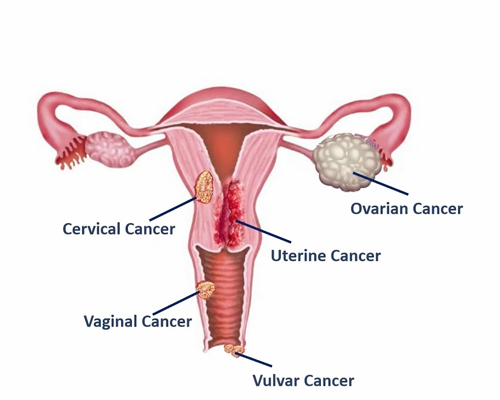gynaecological cancer
Gynecological cancer
Gynaecological Cancers refers to a medical disorder in which cancer or tumour cells form in a woman’s reproductive organs. These include cervical cancer, ovarian cancer, uterine cancer, vaginal cancer, and vulvar cancer.
There are various symptoms linked with gynecological cancers, with each cancer type having its own set of symptoms, and the only way to determine which one you have is to seek a proper consultation.
Gynecological cancers are one of the top causes of cancer-related mortality in women all over the world. Thousands of women are diagnosed with gynaecological malignancies each year, so it is critical to understand the various types of gynaecological cancers.

There are six forms of gynaecological malignancies, three of which are common and three of which are rare, as described below.
- Uterine Cancer
- Cervical Cancer
- Ovarian Cancer
- Vulvar Cancer
- Vaginal cancer
- Gestational trophoblastic tumour
The following gynaecological cancers are rather common and affect a substantial number of women each year:
Cervical Cancer
Cervical cancer is another common type of gynecologic cancer that is one of the top causes of cancer-related deaths in women globally. Every year, a large number of women in India are diagnosed with this illness, and regrettably, due to a lack of knowledge and inadequate cancer screening facilities, the majority of women are diagnosed when the cancer has advanced. In addition, HPV (Human Papillomavirus) infection causes a substantial proportion of cervical malignancies.
CERVICAL CANCER SYMPTOMS:
- Discharge from the cervix.
- Odor in the vaginal area.
- Bleeding after sexual intercourse
- Vaginal bleeding
Regular cancer screenings, as well as the PAP test for HPV detection, are critical for early detection. Cervical cancer can be treated with radical surgery alone if identified early, but those detected later require a combination of chemo and radiation therapy.
Vaccinating young girls to prevent HPV infection before they become sexually active is a highly successful method of preventing cervical cancer and many other types of gynaecological cancer.
Uterine cancer
Uterine cancer is a type of gynaecological cancer that develops in the uterus. Obesity, diabetes, hypertension, usage of oestrogen without progesterone, and other variables that enhance the risk of uterine cancer can occur in anyone.
SYMPTOMS:
- After-menopausal vaginal haemorrhage or spotting
- Lower abdominal pain that has persisted for more than two weeks.
- Bleeding between menstrual periods
- Pain during sexual intercourse
Endometrial malignancies, uterine sarcomas, and endometrial stromal tumours are the three types of uterine cancers. Endometrial cancer is the most prevalent type of uterine cancer, while the other two are extremely rare. Endometrial cancer is also one of the most treatable types of cancer.
In most cases, endometrial cancer is detected early and treated with laparoscopic (minimally invasive) surgery. In most situations, the full treatment involves only 2-3 days in the hospital. Though a small percentage of endometrial cancer patients (approximately 10-15%) may require further treatment in the form of radiotherapy or a combination of radiotherapy and chemotherapy.
Ovarian Cancer
Another common gynaecological cancer is ovarian cancer. It is classified into three types: epithelial ovarian cancer, germ cell cancer, and stromal cell cancer. The most frequent type of ovarian cancer is epithelial ovarian cancer, which accounts for around 85 percent of all ovarian malignancies.
OVARIAN CANCER SYMPTOMS:
- Bloating
- Loss of appetite
- Unknown cause of weight loss
- Frequent or urgent urination
- Discomfort and pain in the pelvic or abdominal region.
Surgery can cure benign epithelial ovarian tumours, while chemotherapy and tumour cytoreductive surgery are used to treat malignant ovarian tumours. One thing to keep in mind concerning epithelial ovarian tumours is that they are highly aggressive and have a tendency to recur at an advanced stage. In such circumstances, treatment is either surgical or chemotherapeutic.
Another type of ovarian cancer is germ cell tumour, which is typically observed in younger people. About 95 percent of these cases are curable with surgery alone, while some cases may require further chemotherapy. Fertility preservation therapy (sparing the other ovary and uterus) is frequently favoured for treating germ cell tumours in young patients.
Stromal cell cancer, the third form of ovarian cancer, is often slow-growing in nature. The vast majority of such situations are curable only by surgery.
Vulvar Carcinoma
Vulvar cancer is an uncommon type of gynaecological cancer that affects the outside of the female genitalia. It typically affects elderly women and is easily identified by the following symptoms:
- Red, pink, or white pimples with a warty surface.
- While urinating, you may experience pain or a burning sensation.
- Bleeding that is not associated with menstruation.
- Presence of white and rough patches.
- An open sore or ulcer that persists.
Vulvar carcinoma is a form of gynaecological cancer that is highly treatable. In most circumstances, major surgery is adequate to treat vulvar cancer; but, in other cases, chemotherapy and radiation therapy may be required.
Vaginal Cancer
Vaginal cancer is one of the most uncommon types of gynaecological cancer. It often affects women over the age of 50, and in most cases, HPV (Human Papillomavirus) infection is the cause of cancer. The following are the symptoms:
- Presence of a visible mass.
- Vaginal haemorrhage or discharge that is abnormal.
- Pain during intercourse
Many cases of vaginal cancer, like vulvar cancer, can be treated with radical surgery, while others may require radiotherapy and chemotherapy.
Gestational Trophoblastic Tumour:
Gestational trophoblastic disease (GTD) refers to a group of tumours that develop during pregnancy. These tumours are likewise uncommon. These tumours typically begin in the cells that would become the placenta during pregnancy. The tumour begins in layers of cells called trophoblast that surround the embryo and is usually benign. These cancers are highly treatable and are typically treated with chemotherapy.
For advanced gynecological cancer treatment, book your appointment with our best gynecologist in Mumbai at KK speciality clinic and hospital.
